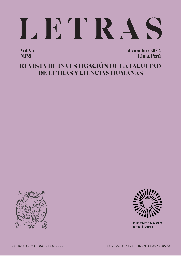La The construction of a queer identity in Eminent Maricones
Abstract
Jaime Manrique’s book, Eminent Maricones (1999), is an autobiographical text that also includes the lives of other famous writers such as Manuel Puig, Reinaldo Arenas and Federico García Lorca, because they all share the queer identity to which the novel’s title refers. This text goes beyond recounting the experiences that Jaime Manrique has with these famous Hispanic writers: it also reveals the reality of the LGBTQ+ community in Latin America and the United States and how they, despite the fact of being famous, did not escape the tyrannical heteronormative society back then. At the beginning of the text, a heteronormative vision of homosexuality is presented, although the author deliberately admits to being gay. Time and maturity allowed Manrique to shed those prejudices and implant a subversive discourse; he also exposes his dual position as a Latin American and Latinx writer. All the experiences throughout his life lead Jaime Manrique to accept his sexuality and sincere love for queer people. This article analyzes this character's coming-of-age and his queer identity. Likewise, the elements that enable him to free himself from an internalized homophobia and freely appropriate the queer subject as his true identity.Downloads
Métricas alternativas
References
Ahmed, S. (2014). The Cultural Politics of Emotion. Routledge.
Ahmed, S. (2019). Fenomenología Queer. Ediciones Bellaterra.
Alarcón-Negy, A. (2002). El texto narrativo homoerótico hispanoamericano en Arenas, Lemebel, Manrique y Pérez [Tesis, Doctor in Philosophy, Modern and Classical Languages]. University of Houston.
Arenas, R. (1992). Antes que anochezca. Tusquets.
Butler, J. (1999). Gender Trouble, Feminism, and the Subversion of Identity. Routledge.
Butler, J. (2002). El género en disputa. El feminismo y la subversión de la identidad. Paidós.
Dollimore, J. (2018). Sexual dissidence [2nd. ed.]. Oxford University Press.
Edwards, J. (2008). Eve Kosofsky Sedgwick. Routledge. https://doi.org/10.4324/9780203004623
Foster, D. (2000). Eminent Maricones: Arenas, Lorca, Puig, and Me by Jaime Manrique. Hispania, 83(3), 472-473. https://doi.org/10.2307/346026.
Foster, D. (2001). El gay como modelo cultural: Eminent Maricones de Jaime Manrique. Temas y variaciones de literatura, 17, 189-209. http://hdl.handle.net/11191/1614
Foster, D. W. (2017). Jaime Manrique: un novelar queer colombiano. Revista de Estudios Colombianos, 49, 8-16. https://colombianistas.org/wp-content/themes/pleasant/REC/REC%2049/Ensayos/49_6_ensayo_foster.pdf
Foucault, M. (1998a). Historia de la sexualidad. T. I: La voluntad de saber. Siglo XXI.
Foucault, M. (1998b). Historia de la sexualidad. T. II: El uso de los placeres. Siglo XXI.
Kimmel, M. (1994). Masculinity as Homophobia: Fear, Shame, and Silence in the Construction of Gender Identity. En Brod, H. (Ed.), Theorizing Masculinities (pp. 213-219). Sage Publications. https://doi.org/10.4135/9781452243627.n7.
Maffesoli, M. (1996). The Time of the Tribes. The Decline of Individualism in Mass Society. Londres: Sage Publications. https://doi.org/10.4135/9781446222133.
Manrique. J. (1999). Eminent Maricones: Arenas, Lorca, Puig, and Me. University of Wisconsin Press.
Preciado, P. y Bourcier, H. (2001). Contrabandos queer. En Aliaga, J. (Ed.), Miradas sobre la sexualidad en el arte y la literatura del siglo XX en Francia y España (pp. 33-46). Universitat de València.
Puig, M. (1976). El beso de la mujer araña. Seix Barral.
Sáez, J. y Carrascosa, S. (2011). Por el culo. Políticas anales. Egales.
Sedgwick, E. (1990). Epistemology of the closet. University of California Press.
Copyright (c) 2022 Letras (Lima)

This work is licensed under a Creative Commons Attribution 4.0 International License.
Este obra está bajo una licencia de Creative Commons Reconocimiento 4.0 Internacional



















